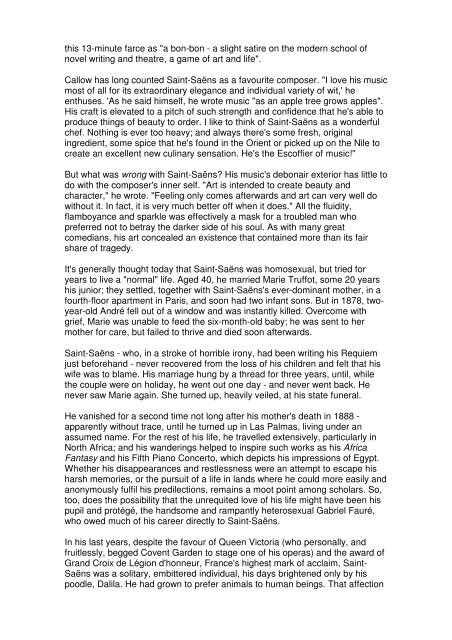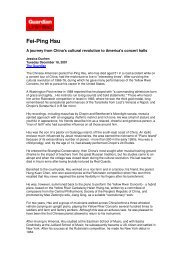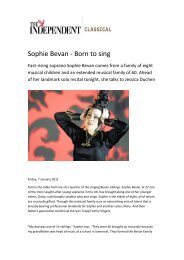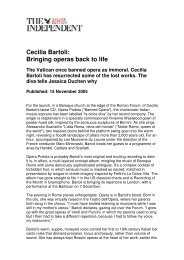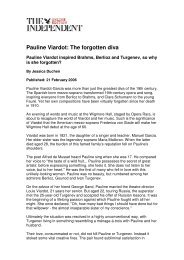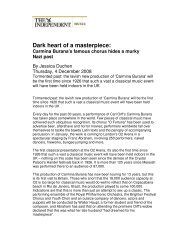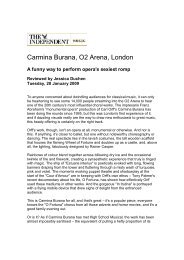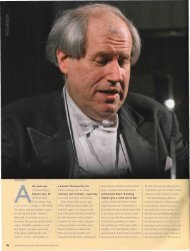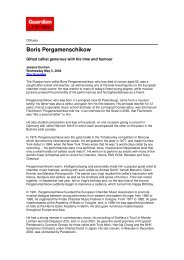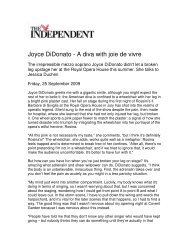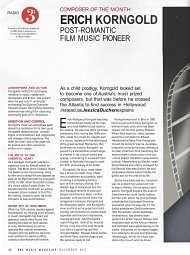The composer who disappeared (twice) - Jessica Duchen
The composer who disappeared (twice) - Jessica Duchen
The composer who disappeared (twice) - Jessica Duchen
Create successful ePaper yourself
Turn your PDF publications into a flip-book with our unique Google optimized e-Paper software.
this 13-minute farce as "a bon-bon - a slight satire on the modern school of<br />
novel writing and theatre, a game of art and life".<br />
Callow has long counted Saint-Saëns as a favourite <strong>composer</strong>. "I love his music<br />
most of all for its extraordinary elegance and individual variety of wit,' he<br />
enthuses. 'As he said himself, he wrote music "as an apple tree grows apples".<br />
His craft is elevated to a pitch of such strength and confidence that he's able to<br />
produce things of beauty to order. I like to think of Saint-Saëns as a wonderful<br />
chef. Nothing is ever too heavy; and always there's some fresh, original<br />
ingredient, some spice that he's found in the Orient or picked up on the Nile to<br />
create an excellent new culinary sensation. He's the Escoffier of music!"<br />
But what was wrong with Saint-Saëns? His music's debonair exterior has little to<br />
do with the <strong>composer</strong>'s inner self. "Art is intended to create beauty and<br />
character," he wrote. "Feeling only comes afterwards and art can very well do<br />
without it. In fact, it is very much better off when it does." All the fluidity,<br />
flamboyance and sparkle was effectively a mask for a troubled man <strong>who</strong><br />
preferred not to betray the darker side of his soul. As with many great<br />
comedians, his art concealed an existence that contained more than its fair<br />
share of tragedy.<br />
It's generally thought today that Saint-Saëns was homosexual, but tried for<br />
years to live a "normal" life. Aged 40, he married Marie Truffot, some 20 years<br />
his junior; they settled, together with Saint-Saëns's ever-dominant mother, in a<br />
fourth-floor apartment in Paris, and soon had two infant sons. But in 1878, twoyear-old<br />
André fell out of a window and was instantly killed. Overcome with<br />
grief, Marie was unable to feed the six-month-old baby; he was sent to her<br />
mother for care, but failed to thrive and died soon afterwards.<br />
Saint-Saëns - <strong>who</strong>, in a stroke of horrible irony, had been writing his Requiem<br />
just beforehand - never recovered from the loss of his children and felt that his<br />
wife was to blame. His marriage hung by a thread for three years, until, while<br />
the couple were on holiday, he went out one day - and never went back. He<br />
never saw Marie again. She turned up, heavily veiled, at his state funeral.<br />
He vanished for a second time not long after his mother's death in 1888 -<br />
apparently without trace, until he turned up in Las Palmas, living under an<br />
assumed name. For the rest of his life, he travelled extensively, particularly in<br />
North Africa; and his wanderings helped to inspire such works as his Africa<br />
Fantasy and his Fifth Piano Concerto, which depicts his impressions of Egypt.<br />
Whether his disappearances and restlessness were an attempt to escape his<br />
harsh memories, or the pursuit of a life in lands where he could more easily and<br />
anonymously fulfil his predilections, remains a moot point among scholars. So,<br />
too, does the possibility that the unrequited love of his life might have been his<br />
pupil and protégé, the handsome and rampantly heterosexual Gabriel Fauré,<br />
<strong>who</strong> owed much of his career directly to Saint-Saëns.<br />
In his last years, despite the favour of Queen Victoria (<strong>who</strong> personally, and<br />
fruitlessly, begged Covent Garden to stage one of his operas) and the award of<br />
Grand Croix de Légion d'honneur, France's highest mark of acclaim, Saint-<br />
Saëns was a solitary, embittered individual, his days brightened only by his<br />
poodle, Dalila. He had grown to prefer animals to human beings. That affection


